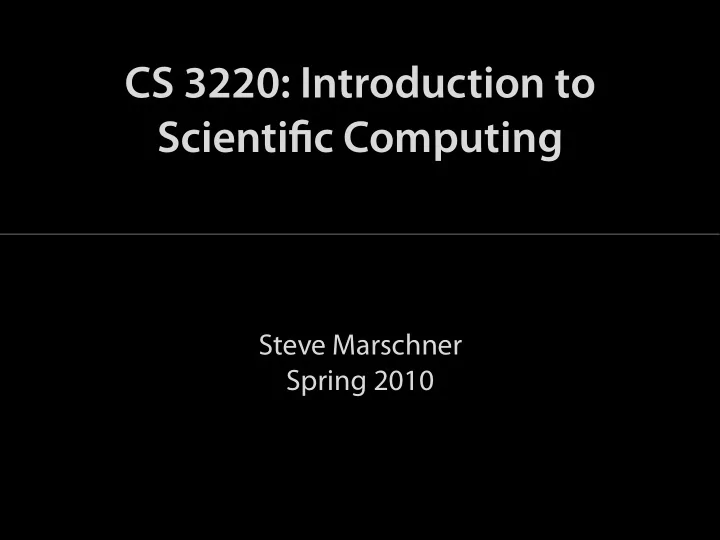

CS 3220: Introduction to Scientific Computing Steve Marschner Spring 2010
scientific computing : The use of computers to solve problems that arise in science (and engineering, medicine, …). numerical methods : Algorithms (methods) for solving problems with real numbers by numerical (as opposed to symbolic) means. If your variables represent real-valued quantities, you’re doing numerical computing. Perhaps surprising are: • audio (stream of sound pressure samples) • video (grids of intensity or color samples) • computational geometry (positions in space) • computer graphics and vision (geometry, color, light…) • information retrieval (more on this in a moment) with abundant computing power, more applications are using numerical methods all the time.
Numerical computing in science and medicine Computed tomography: seeing into the body X-ray crystallography: learning the shape of proteins Climatology: predicting global warming
Numerical computing in science and medicine Computed tomography: seeing into the body X-ray crystallography: learning the shape of proteins Climatology: predicting global warming Steven W. Smith—dspguide.com U.S. FDA
Numerical computing in science and medicine Computed tomography: seeing into the body X-ray crystallography: learning the shape of proteins Climatology: predicting global warming
Numerical computing in science and medicine Computed tomography: seeing into the body X-ray crystallography: learning the shape of proteins Climatology: predicting global warming
Numerical computing in science and medicine Computed tomography: seeing into the body X-ray crystallography: learning the shape of proteins Climatology: predicting global warming Thomas Splettstoesser—Wikimedia Commons
Numerical computing in science and medicine Computed tomography: seeing into the body X-ray crystallography: learning the shape of proteins Climatology: predicting global warming Simulated deformation of citrate synthase during substrate binding Kalju Kahn, UCSB
Numerical computing in science and medicine Computed tomography: seeing into the body X-ray crystallography: learning the shape of proteins Climatology: predicting global warming NOAA
Numerical computing in science and medicine Computed tomography: seeing into the body X-ray crystallography: learning the shape of proteins Climatology: predicting global warming Robert A. Rohde
Numerical computing in automotive engineering Safe cars: electronic stability control Autonomous vehicles: path planning
Numerical computing in automotive engineering Safe cars: electronic stability control Autonomous vehicles: path planning images from: Liebemann et al. “Safety and Performance Enhancement: The Bosch Electronic Stability Control (ESP)” in The 19th International Technical Conference on the Enhanced Safety of Vehicles (ESV)
Yaw rate control at work Fifth Gear —demo of Bosch ESP system
Numerical computing in automotive engineering Safe cars: electronic stability control Autonomous vehicles: path planning Liebemann et al. Liebemann et al.
Yaw rate control by braking Fifth Gear —demo of Bosch ESP system
Numerical computing in automotive engineering Safe cars: electronic stability control Autonomous vehicles: path planning Mark Campbell—Cornell DARPA Urban Challenge team
Numerical computing in automotive engineering Safe cars: electronic stability control Autonomous vehicles: path planning Mark Campbell—Cornell DARPA Urban Challenge team
Mark Campbell—Cornell DARPA Urban Challenge team
Mark Campbell—Cornell DARPA Urban Challenge team
Numerical computing in entertainment Game physics: new kinds of gameplay Movie graphics: realistic lighting Movie vision: camera tracking, or “matchmove”
Numerical computing in entertainment Game physics: new kinds of gameplay Movie graphics: realistic lighting Movie vision: camera tracking, or “matchmove” Crytek GmBH—advertisement for CryEngine 2 game engine
Numerical computing in entertainment Game physics: new kinds of gameplay Movie graphics: realistic lighting Movie vision: camera tracking, or “matchmove” Hand with Reflecting Sphere. M. C. Escher, 1935. lithograph Gene Miller & Ken Perlin, 1982
Numerical computing in entertainment Game physics: new kinds of gameplay Movie graphics: realistic lighting Movie vision: camera tracking, or “matchmove” Real environment, computed objects Jonas Unger
Numerical computing in entertainment Game physics: new kinds of gameplay Movie graphics: realistic lighting Movie vision: camera tracking, or “matchmove” Torr & Zisserman, in Vision Algorithms: Theory and Practice , 2000
Rendered model added Camera footage Scenespector Systems—VooCAT product demo Zaha Hadid Architects—proposed Guggenheim Vilnius museum
Numerical computing in “non-numerical” applications Information retrieval: Google’s PageRank
Numerical computing in “non-numerical” applications Information retrieval: Google’s PageRank Idea 1: importance = citation count — simple integer exact answer Idea 2: importance = citation count weighted by importance — now it is a self-referencing definition for a real-valued quantity (and it must be approximated numerically) Computing PageRank works out to be a linear algebra problem: finding the largest eigenvalue of a matrix.
Problem taxonomy linear or nonlinear? how many unknowns? what kind of equations? It’s all about solve minimize diff. eq. LINEAR converting hard 1-D (arithmetic) (projection) linear ODEs problems to linear linear least easier ones. n- D linear PDEs systems squares NONLINEAR solve minimize diff. eq. minimum 1-D root finding ODEs searching nonlinear go that wa y! n- D optimization PDEs equations
Method characteristics accuracy stability robustness “Never in the history of mankind has it been possible to produce so many wrong answers so quick ly!” —Carl-Erik Fröberg
prerequisites calculus, linear algebra some programming experience Matlab CS1132: Transition to Matlab A one-credit course for students who know another language (e.g. Java) and need to map the ideas over to Matlab. Informational meetings: Tuesday (1/26) 3:35 Phillips 219 Thursday (1/28) 4:40 Thurston 205
course mechanics http://www.cs.cornell.edu/Courses/cs3220
Recommend
More recommend